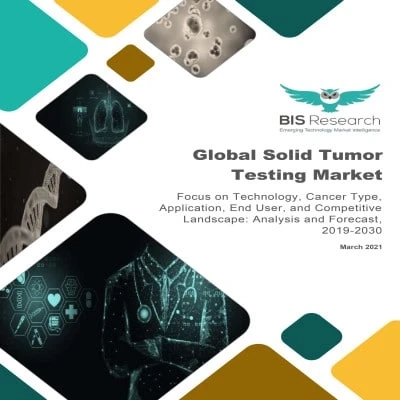According to the World Health Organization, “Cancer is a large group of diseases that can start in almost any organ or tissue of the body when abnormal cells grow uncontrollably, go beyond their usual boundaries to invade adjoining parts of the body and/or spread to other organs.” According to the National Cancer Institute (NCI), a solid tumor is defined as “an abnormal mass of tissue that usually does not contain cysts or liquid areas. Solid tumors may be benign (not cancer) or malignant (cancer).” In the current study, considerations for solid tumors follow the definition of the National Cancer Institute. Examples include sarcomas, carcinomas, and lymphomas of the organs that are affected. Major solid tumors include breast cancer, prostate cancer, colorectal cancer, lung cancer, and melanoma, among others.
BIS Research healthcare experts have found the solid tumor testing market to be one of the growing markets, which is predicted to grow at a CAGR of 6.09% during the forecast period, 2020-2030. The market is driven by the need for the development of an advanced solution based on various technologies such as next-generation sequencing, in-situ hybridization, and polymerase chain reaction for cancer research in various applications such as diagnosis, prognosis, and treatment.
The market is favored by the development of high-throughput, rapid, sensitive, and multi-parametric solutions for prognosis, diagnostics, and treatment. The gradual increase in the prevalence of cancer globally has furthered the solid tumor testing market.
Furthermore, several contract research organizations are focusing on the development of solid tumor testing services, which enable to perform an extensive preclinical study at lower operation costs and less turn-around time.
Competitive Landscape
The exponential rise in the application of precision medicine on the global level has created a buzz among companies to invest in the development of high-resolution multiplex diagnostics providing information on cellular interaction and tissue heterogeneity to understand disease biology and pathology. Due to technologically advanced solutions and intense market penetration, companies such as Quest Diagnostics Incorporated have been a pioneer and a significant competitor in this market.
Other key players in the market are Abbott Laboratories, Illumina, Inc., F. Hoffmann-La Roche Ltd., Bio-Rad Laboratories, Inc., Beijing Genomics Institute (BGI), QIAGEN N.V., ASURAGEN, INC., NeoGenomics Laboratories, Inc., Invivoscribe, Inc., Inviate Corporation, Opko Health, Laboratory Corporation of American Holdings, OmniSeq, and Guardant Health.
On the basis of region, North America holds the largest share of the global solid tumor testing market due to improved healthcare infrastructure, rise in per capita income, and availability of state-of-the-art research laboratories and institutions in the region. Apart from this, Europe is anticipated to grow at the fastest CAGR of 6.45% during the forecast period 2020-2030.
The global solid tumor testing market utilizes technologies such as next-generation sequencing, in-situ hybridization, immunohistochemistry, polymerase chain reaction, and other technologies for the development of advanced diagnostic tools to cater to a holistic approach toward the treatment of cancer. The rising incidence of cancer and the increasing global burden of the disease has subsequently furthered the growth of the market.
Growth Drivers
• Rising Incidence of Cancers
• Decreasing Cost of Sequencing
• Expected Increase in Adoption of Genetic Testing
• Increasing Adoption of Inorganic Growth Strategies
Market Restraints
• Uncertain Reimbursement Policies
• Requirement of High Capital Investment Hindering Expansion
• High Pricing Pressure
Market Opportunities
• Massive Scope for Adoption of Genomic-Based Medicine in Emerging Nations
• Increasing Disposable Income in Emerging Companies
• Informatics and Technological Innovation for Large Consumer Base
• Mushrooming Direct-to-Consumer Testing Services Market
Key Questions Answered in this Report:
• What are the major market drivers, challenges, and opportunities in the global solid tumor testing market?
• What is the potential impact of biotechnological advancements in the diagnostic industry among end users such as researchers, pathologists, and laboratory technicians?
• What is the current market demand along with future expected demand for the global solid tumor testing market?
• What are the key development strategies that are implemented by the major players in order to sustain the competitive market?
• How is each segment of the market expected to grow during the forecast period 2020-2030? Following are the segments:
o cancer type
o technology
o application
o end user
o region
• Which are the leading players with significant offerings to the global solid tumor testing market?
• What is the expected market dominance for each of these leading players?
• Which emerging companies are anticipated to be highly disruptive in the future, and what are their key strategies for sustainable growth in the global solid tumor testing market?
Request a Sample - https://bisresearch.com/requestsample?id=1093&type=download
Within the research report, the market is segmented on the basis of cancer type, technology application, end users, and region. Each of these segments covers the snapshot of the market over the projected years, the inclination of the market revenue, underlying patterns, and trends by using analytics on the primary and secondary data obtained.
BIS Related Studies



